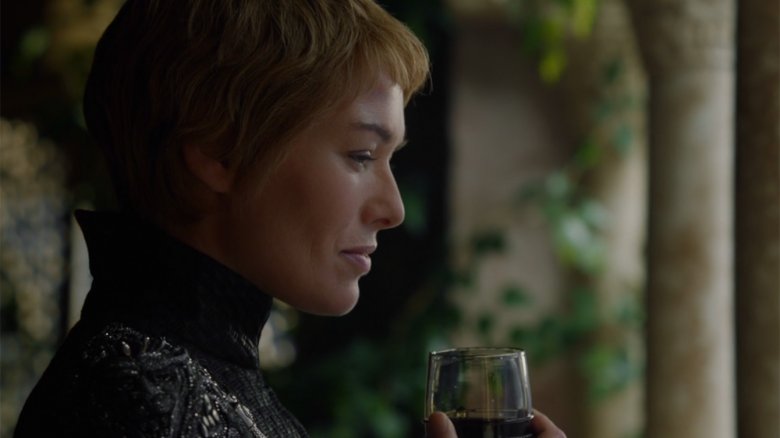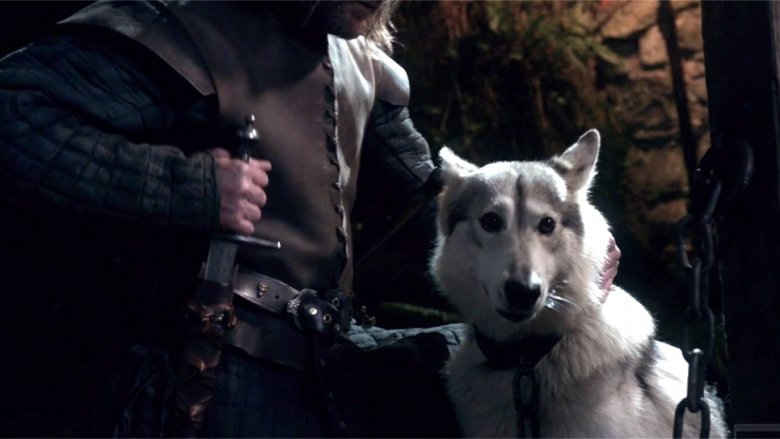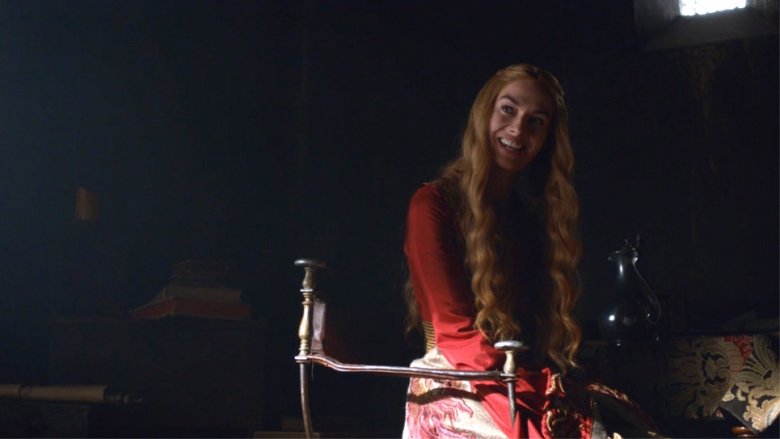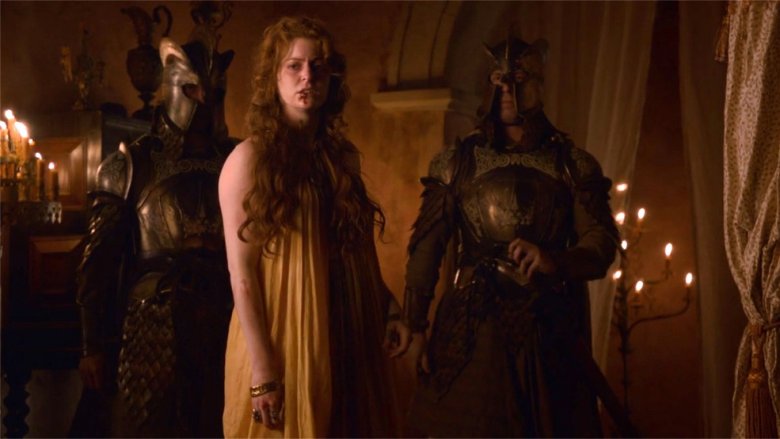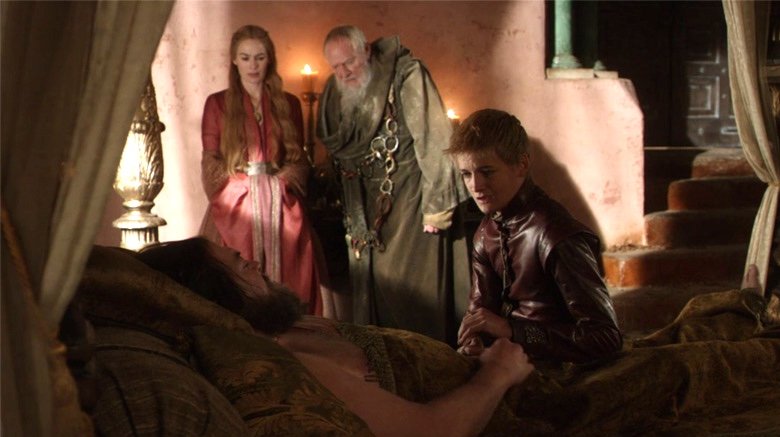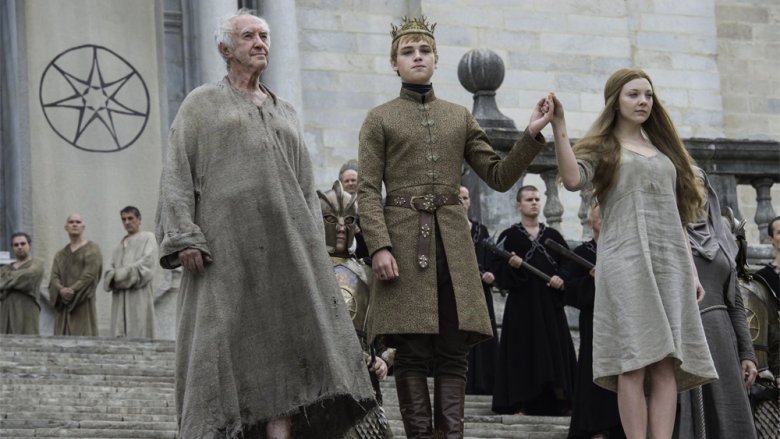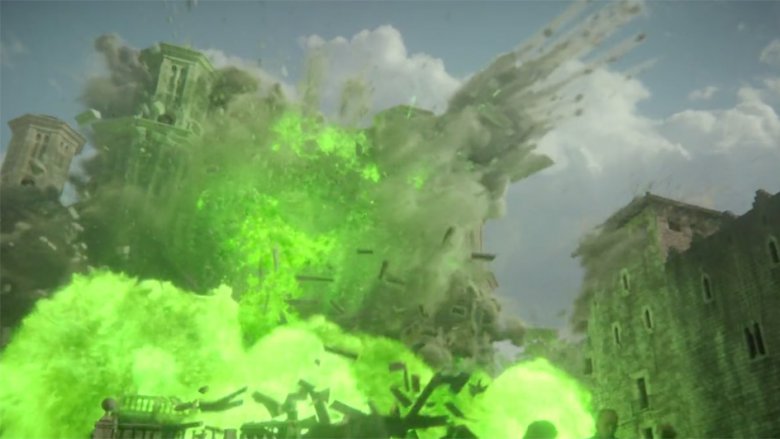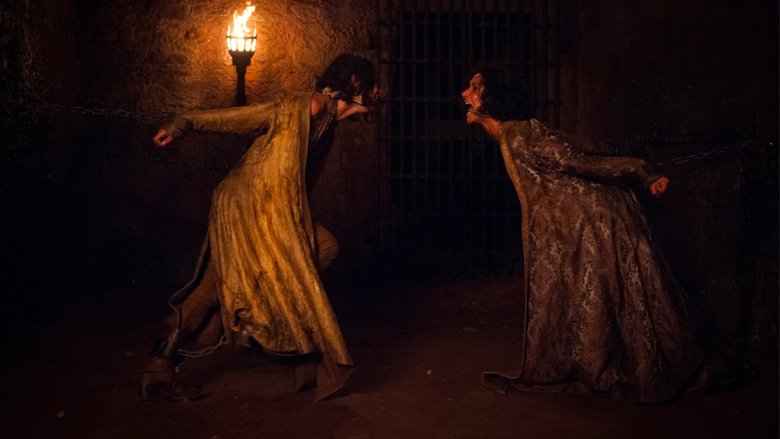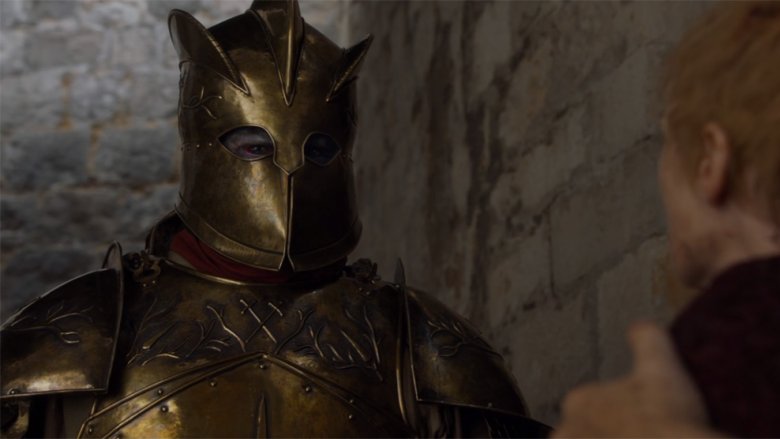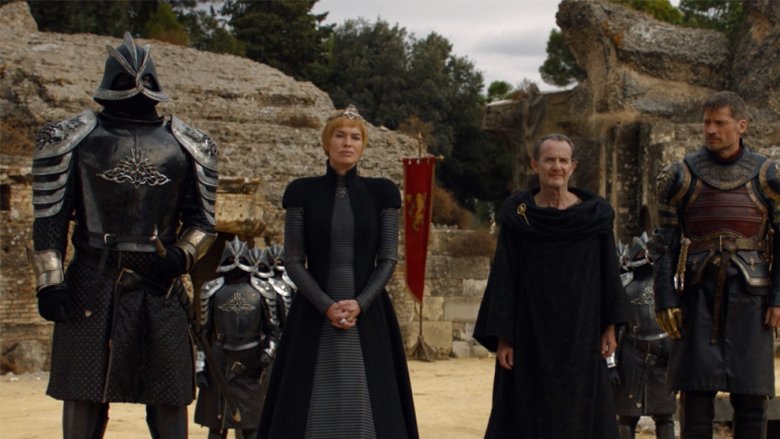The Worst Things Cersei Lannister Has Ever Done
Over the course of eight seasons of Game of Thrones, Cersei Lannister managed to get on the bad side of just about every other person in Westeros. She was cold, manipulative, and thanks to growing up as one of her father's many political pawns, seemed to have an unlimited amount of hatred for almost everyone who wasn't named "Lannister," and a couple of people who were. She was arguably the primary villain of the entire series, and while there were plenty of moments when we definitely wanted to see it, Cersei did not mess around when it came time to get revenge, and was absolutely ruthless in getting what she wanted.
As a result, she racked up a laundry list of sins so intense that maintaining a longstanding sexual relationship with her brother doesn't even crack the top ten. From complicated schemes to just straight up ordering someone to kill their own dog, here are the worst things Cersei Lannister ever did.
Lady killer
One of the first indications in the series that the Lannister family is going to be a pretty big problem — aside from that whole thing where Jaime shoves a ten year-old out of a window after boning down with his own sister — comes when they're traveling with the Starks down to King's Landing in the early days of the first season. Prince Joffrey, who as you may know is the absolute worst, gets into a fight with strong-willed young lady and future world-saving assassin Arya Stark, prompting Arya's pet wolf, Nymeria, to chomp on his arm.
Even though his worst extremes were still a year or two away, everyone watching was pretty okay with having Joffrey get a bite or two taken out of him. Alas, Cersei is not exactly stoked about the situation. Arya, realizing that things are about to get pretty bad for Nymeria, sends her away to live in the woods for the next six seasons. A solid plan, but for Sansa Stark and her pet wolf Lady, it doesn't exactly work out. Since she can't take vengeance on Nymeria, Cersei orders that Lady be killed in her place, with Sansa and Arya's duty-bound dad Ned doing the beheading.
They might be bad, but most of the other terrible things that Cersei has done can at least be justified as protecting her family, consolidating her power, or even getting some justified payback against her enemies. This, though? Beheading a child's dog in front of her, and it's not even the dog that you're actually mad at? That is next level Wicked Witch stuff.
Serving looks
It might be tempting to blame all of Joffrey's downright supervillainous acts of cruelty on Cersei's parenting style, which could charitably be described as overly indulgent at best. Really, though, as much as she might've spoiled her son and paved the way for the single most hateable character in Game of Thrones, the truth is that Joffrey's responsible for his own actions. If nothing else, Cersei occasionally tries to actually temper her son's most terrible instincts, even if those attempts fail miserably.
There is, however, more than a little indication that Joffrey comes by his bloodthirsty tendencies honestly. In the first episode of season 3, a conversation between Cersei and Tyrion brings up a surprisingly bloody memory from Cersei's childhood. At the age of nine, Cersei found out that one of her servants had stolen a necklace, and — without her father's knowledge — ordered the guards to beat the girl. The guards, at Cersei's direction, went about their task pretty thoroughly, to the point where the girl — also nine years old — wound up losing an eye. When Tyrion brings that up, Cersei coldly tells him that the girl never stole anything again.
That is harsh coming from anyone, but going for Advanced Placement levels of spitefulness and bloodlust at nine is a pretty good indication that Cersei has always been running pretty low on chill.
Mistaken identity, take two
The execution of Lady the direwolf wasn't the last time Cersei wound up taking her anger out on the wrong target. When she tried to get revenge on her brother Tyrion through the woman he loved, however, she did it by accident.
With the exception of Theon Greyjoy, who spends about a season having the worst day of his life every single day, there are few characters who had it as rough as Ros. While she initially had plenty of success in Winterfell, her move to King's Landing went about as well as Ned Stark's, for the same reason. She got caught up in the Lannister family drama when Cersei decided to punish Tyrion and keep him in check by having the sex worker with whom he was in love taken prisoner. Unfortunately, Cersei was under the mistaken impression that Tyrion was in love with Ros, who wound up being abducted and beaten, while Tyrion played along in order to save the woman he actually did love, Shae, from a similar fate.
While it was certainly brutal, all things considered, things could've been worse for Ros. Then again, we mainly know that because things got much, much worse for Ros immediately after, thanks to the other Lannisters.
Royal complications
Things started to go downhill for the Stark family the moment Ned agreed to become Hand of the King for Robert Baratheon, but the brakes were well and truly off when Robert died, leaving Ned and the kids with no allies in King's Landing. Needless to say, Robert's death was orchestrated by Cersei, his long-suffering wife, who didn't want the king to find out that her son was also her nephew.
None of that is the terrible part — well, not by Game of Thrones standards, anyway. We should expect that anyone in Westeros with anything even resembling a royal title is going to meet a bad ending. That's just the way the world works. What's really bad is how needlessly complicated it is. In a show where all of our main characters have access to weirdos in muumuus who give them as much poison as they want, there is no need to go through Cersei's fragile, multi-step assassination plot.
Here's how it goes down. After seducing her cousin Lancel — that is step one of this thing — Cersei gets him to deliver way too much wine to Robert while he's out hunting. Robert, too drunk to hunt well, gets gored to death by a wild boar. That means that Cersei is relying on three other living beings, including Robert himself and a very large pig, to play their parts perfectly. Next time, just blow him up with a hidden cache of ancient explosives or something.
Faith Militant
While she's never been shy about taking matters into her own hands, Cersei's also willing to use others to get what she wants. Unfortunately for her, that has about a 50 percent success rate, and in the case of the Sparrows and their leader, it was a full-on catastrophe on about three different levels.
If you missed it, the Sparrows were members of a strict, ultra-conservative religious order that was led by a nameless leader called the High Sparrow, who was also the guy that played President Zartan in the G.I. Joe movies. Thanks to their severe beliefs and allegedly righteous hatred of sinners, Cersei had Brother Zartan named as High Septon — the Westeros equivalent of the Pope — for the specific purpose of having her political rivals in House Martell imprisoned, humiliated, and put on trial. There was definitely no possible way that could backfire on a woman with a prominent public identity who had done a bunch of murders and was involved in more than one incestuous relationship, including one with an impressionable young man who had just found religion with these extremely militant self-scarring monks, right? Right.
In a twist that no one could've possibly seen coming, the Faith Militant turned on Cersei almost immediately, imprisoning and starving her until she was ready to confess her sins and accept their judgment. Eventually, they cut off her hair and forced her to make a nude "Walk of Atonement" through the streets of King's Landing, which might be the single worst decision that anyone on this show had ever made.
Explosive temper
If there's one thing that should be clear at this point, it's that Cersei Lannister is not exactly into forgiveness as a concept. Someone, maybe Lancel, should've probably mentioned that to the High Sparrow before he decided to humiliate Cersei by parading her naked through the streets and ringing a shame bell while her citizens threw things at her. Unfortunately for the Sparrows, the Tyrells, her son Tommen, fans of King's Landing architecture, and anyone else who happened to be in the area, they did not.
In one of the most satisfying moments of revenge in the entire show — right up there with Arya making dinner for House Frey and Sansa having a chat with Littlefinger about what he'd been up to for the past seven years — Cersei regains control of King's Landing in an extremely brutal fashion. Using a hidden cache of explosives stashed underground by the Mad King, she blows up the Great Sept of Baelor and everyone in it, putting an end to four ongoing subplots at once in one glorious lime green fire.
Of course, as easy as it is to be on Cersei's side for this one, blowing up a 200-year-old church to kill your enemies is generally frowned upon, and very rarely considered to be the best way to solve one's problems. Ultimately, while she would never really seem to regret her act of large-scale terrorism, Cersei did suffer one unforeseen consequence when her son, Tommen, committed suicide after witnessing the destruction and the death of his queen.
Kiss of death
While the conflict between the Lannisters and the Starks has been the main focus of the show since the very first episode, the rivalry between the Lannisters and House Martell is also a major component, if only because it led to one of the most brutal moments the show had ever seen.
While the path to the climactic moment is as complicated as anything else in Game of Thrones, it really gets started when Oberyn Martell is killed in a duel with the Mountain while they're both acting as proxies in a trial by combat. This, obviously, does not sit well with Oberyn's lover and eight-time mother of his children, Ellaria, who gets revenge by killing Cersei's daughter, Myrcella, who was sent to the Martells to secure an alliance via arranged marriage. Even if Cersei were the type to forgive, this would be a pretty difficult one to get over, but she is not, and decides to go harder to avenge her daughter.
When Ellaria is captured, so is her daughter Tyene, and the two are brought to King's Landing to suffer the cruel fate that Cersei has planned. Rather than just executing the two of them, Cersei has Ellaria and Tyene chained up in the dungeon, facing each other, and, in true Batman villain style, poisons Tyene with a kiss. The poison in question was the same one Ellaria used on Myrcella, "The Long Farewell," which takes long, painful hours (and possibly even days) to kill its victims. With that, Cersei leaves Ellaria alive, promising that her soldiers will do whatever they can to make sure that she stays alive to witness every grisly moment of her daughter's death. It might not be as flashy as blowing up the Sept, but there's a viciousness to this one that's hard to beat, unless your name happens to be Arya Stark.
Frankenmountain
Whenever someone mentions that Game of Thrones is an intense prestige drama about interweaving political machinations and the nature of war and evil, it's always worth keeping in mind that while that's true, it's also a show in which an evil queen made a Frankenstein.
Okay, so technically Cersei did not actually turn the Mountain into an unkillable flesh golem herself, and "Frankenstein" might be the wrong word since there's only one dead body involved and not the several that you'd need if you were going to go full Mary Shelley on it. Instead, the part of the mad scientist was played by her advisor Qyburn, and the single body in question was that of the Mountain, a massive and unrepentantly brutal warrior who served as Cersei's hitman on a number of occasions. When he was finally taken down by poison, Cersei gave Qyburn the order to resurrect him with his forbidden knowledge at any cost.
The result was the all-new, all-different Ser Gregor Clegane, a hulking, perpetually armored figure who can get stabbed through the chest without reacting, bleeding, dying, or doing anything else that you might expect from someone who, you know, wasn't a Frankenstein. Maybe that's why she wasn't all that concerned about the army of zombies marching down from the North: she already had one who could vouch for her once they arrived.
Somebody else's problem
Cersei was most certainly cunning, clever, and ruthless, but for all her pretense, she wasn't exactly great at planning for the future. Nowhere is this more evident than the finale of season 7, when she agrees to set aside the war for the Iron Throne in order to fight back the much larger threat: the Night King and his army of bloodthirsty, nearly unkillable undead wights.
For any relatively reasonable person, the White Walkers who have just busted through a 700-foot magic ice wall with a zombie dragon would seem like a problem so massive that maybe they could sort out this whole who's-the-real-queen stuff once the apocalyptic disaster had been averted. For Cersei, though, potential armageddon is just another great opportunity! After swearing to aid them in the fight, Cersei promptly betrays her would-be allies, reasoning that either they deal with the problem and wind up too weak to challenge her, or get killed and leave her with fewer enemies to deal with.
Even if you're not up on the lore of the show, you can probably spot the problem here. If Daenerys and Jon Snow lose, the Night King adds their considerable forces (including two more dragons) to his Sam Raimi-esque Army of Darkness. If they win, they have just proven that their army is strong enough to literally defeat the apocalypse, meaning that the Lannister armies are probably not going to be an issue. Which, it turns out, is exactly what happens, teaching us all a crucial lesson about how you should never, ever let your enemies level up without you.
